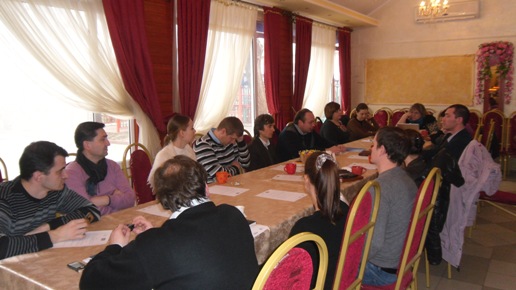On February 22nd in Moldova, the book “How to get rid of post-Sovietness,” written by the Institute of World Policy, the Georgian Foundation for Strategic and International Studies (GFSIS), and the Institute for Development and Social Initiatives “Viitorul” was presented at a round table of Moldovan and Transnistrian experts.A difference of opinions between scientists from the Republic of Moldova and Transnistria, as well as between political analysts, psychologists, and businessmen, fueled the discussion.
Moldovan expert Cornel Ciurue emphasized in his speech that there is a propensity to employ arguments of a positive Soviet past, and this behavior constitutes a main element of post-Sovietness. According to the speaker, “Moldavian society is still tied to its Soviet past, and this assertion has been confirmed by the poll conducted at the end of November, 2009. According to the poll’s collected data, 48.6% of respondents regret the dissipation of the Soviet Union, contrasting with the 32.4% of respondents who do not share this sentiment. This information becomes even more valuable and validated if we take into account differences in comprehension of living standards, housing, healthcare, education, and law-enforcement agencies.”
The Transnistrian individual also became an object of analysis at the round table. Romantically denoted as “a citadel of everlasting Slavdom in the permanent fight against the forces of westernization and repressive capitalistic economics,” it seems the cosmopolite Transistrian person disdains “Romanian-ness” and embodies a fundamental element of Moldovan identity. Cornel Ciurue defined other post-Soviet characteristics existent in the region alongside this sociopsychological phenomenon: insincerity and duplicity in VIP-culture, and a perpetual disposition of enmity, which couples presumption of collective poverty with denial of one’s own paucity (at least ostensibly).
Elena Bobkova, head of the Department of Sociology at the University of Tiraspol “T. Shevchenko,” defined characteristics of post-Sovietness which dominate in the Transistrian region, and she remarked that polls indicate public affirmation of Soviet authority by 70% of respondents. According to Transistrian experts, paternalism and great respect for authority is deeply rooted in the hearts of people in the Transistrian region. Transistrians also feel sympathy for authoritarian models of governance, considering these models predominant to democracy. Ms. Bobkova likened “Romanian-ness” in Moldova to a “blue-blood ideology”; this identity only characterizes a higher-class portion of society. Nevertheless, the Moldovan expert admits that people on the left bank accept themselves as “the last outpost of the Former soviet Union”. Ms. Bobkova identified three levels of Transistrian identity: 1) ethnic (Moldovans, Russians, Ukrainians), 2) national (Transistria), and 3) “over-national” (orthodox Slavdom).
The round table discussion demonstrated measurable differences in evaluations of the Soviet past on both sides of the Dnister. Firstly, Transistria’s stance on the so-called “social package” (social guarantees present during the Soviet Union period) is proof of Soviet authorities’ current predomination in the area. Moldovan experts at the discussion demonstrated that the importance of social packages diminishes when an “overwhelmed country” has to demonstrate economic efficiency. Moreover, Soviet power has been criticized and reevaluated even in Russia, which is a country-model for Moldovan experts.
Secondly, contentious debates have taken place in evaluation of the Soviet Union’s role post-World War II. The Transistrian side supposes that Moldovan experts undervalue the role of the Soviet Union, while the Moldovan side reciprocally opines that the Transistrians completely ignore the contributions of Soviet Union allies.
Thirdly, Moldovan experts emphasize that Moldovans suffer from Western ideology, which prevents them from clear perception and evaluation of Soviet patrimony. Admitting that it is impossible to cognize the modern world without ideology, Moldovan experts surmise that the “ideological glasses” through which we look at the world nowadays in Moldova are accepted all over the civilized world (including Russia), and the Transistrian side risks falling further behind modernity if it does not want to “change the glasses.”
The round table closed with the visiting of a wine vault, Purcari, where the experts from both sides took part in a wine degustation.




Comments theme
Comments themeComments themeComments themeComments themeComments themeComments themeComments themeComments themeComments themeComments themeComments themeComments themeComments themeComments themeComments themeComments themeComments themeComments themeComments themeComments.